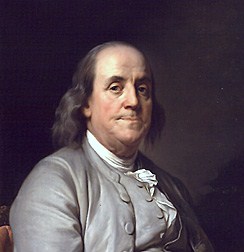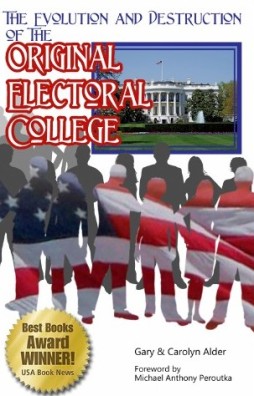Election of Executive – June 2
A proposal was made to postpone the discussion of the executive branch until the issue of the senate was decided. The proposal was voted down, so the topic of the executive was resumed.
Mode of Appointing
Mr. Wilson proposed a substitute resolution to divide the states into districts and let the people eligible to elect members of the House of Representatives choose one or more “electors” from each district. These electors would then select the president. These are his words:
“that the Executive Magistracy shall be elected in the following manner: That the states be divided into _____ districts; & that the persons qualified to vote in each district for members of the first branch of the national legislature elect _____ members for their respective districts to be electors of the Executive Magistracy, that the said Electors of the Executive magistracy meet at _____ and they or any _____ of them so met shall proceed to elect by ballot, but not out of their body _____ person __ in whom the Executive authority of the national Government shall be vested.”
Mr Wilson wanted an election without the intervention of the states. He thought that this was better than an election by the national legislature.
Mr Gerry was opposed to the election by the national legislature saying that it would cause intrigue and trading votes for favors. He liked Mr. Wilson’s plan but was afraid that it would turn too much power to partisans and weaken the states. He preferred votes by states rather than electors. Alternatively he favored “…letting the Legislatures nominate, and the electors appoint.” He was also concerned that the people might not be well enough informed to directly choose electors, particularly in large districts.
Mr. Williamson saw no advantage in having another set of electors chosen by the people when the people had already chosen the members of the House of Representatives. It seemed to him more bother and expense.
VOTE – on Mr. Wilson’s Substitute
No
VOTE – on Legislature electing Executive for 7 years
Yes
No Salary for Executive
Dr. Franklin moved to postpone the discussion of salary of the executive in order for him to propose that expenses be defrayed but no salary be offered to the executive.

Benjamin Franklin suggested that the executive (or executives) serve without salary. “…do not sow the seeds of contention, faction & tumult, by making our posts of honour, places of profit.” This was not an effort to save money. To listen to the reasoning that he used in his speech to support his idea click the “listen” button below. To read his speech click the “read” button.
The committee listened to Dr. Franklin’s speech out of respect to him, but action on the proposal was postponed.
Mr. Dickenson moved “that the Executive be made removable by the National Legislature on the request of a majority of the Legislatures of individual States.” He wanted considerable powers to be left in the hands of the States.
Mr. Bedford seconded the motion.
Mr. Sherman said the National Legislature should be able to remove the Executive at pleasure.
Mr. Mason wanted some way to remove an unfit executive. He was against making the Executive a creature of the Legislature.
Mr. Madison and Mr. Wilson were opposed to states having an equal vote to remove an executive. This would let the small states keep an unfit executive when a majority of the people wanted to get rid of him.
Mr Dickenson was adamant that the the legislative, executive, and judicial were to be kept as independent as possible. He thought the strong type of executive that some people were contemplating was inconsistent with a republic. A strong executive would be found only in a limited monarchy. The strength of the executive in the British government comes largely from those individuals that the Crown draws to itself. In our situation we need to find some substitute. He thought that the two branches of the legislature helped to provide stability. He was also in favor of keeping the states strong rather than consolidating them into one nation which he thought would eventually bring about the end of this nation as it had other simple republics. He thought that a limited monarchy was one of the best governments possible but that monarchy did not fit in with the situation in this land or “the spirit of the times” as he called it. We could not easily create a class of nobles that would be required for a limited monarchy. He believed that even though we would not be able to attain the best form of government we should not despair. The fact that ancient republics flourished for a while then vanished shows that something was amis in their structure. We should therefore seek to remedy those structural problems. Fortunately, because the nation was already composed of independent states and the national legislature was to be divided into two houses, these two factors could provide the solution to the dilemma.
Motion to strike out removal of Executive “on request by a majority of the Legislatures of the individual States”
VOTE – on removing this clause
No
Motion to remove Executive by National Legislature on request by a majority of state Legislatures.
VOTE – on this motion
No
Motion to make Executive ineligible for re-election after seven years.
VOTE – on this motion
Yes
Mr. Williamson moved to add clause “and to be removable on impeachment & conviction of mal-practice or neglect.”
VOTE – on this motion
Yes
– National Executive elected by Executives of the States


